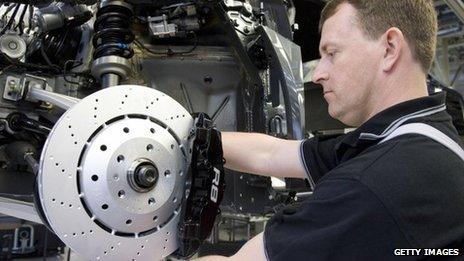Fire in small German town could curb world car production
- Published

When a fire in the small town of Marl in the west of Germany closed down an obscure chemical plant on 31 March, it barely made headlines.
Two people died and that was a personal tragedy for their families and friends, but the shock waves did not resonate far beyond.
Except, it turns out, to the other side of the Atlantic - in Detroit, Michigan.
So tight is the global car industry's supply chain that one break in a small link threatens the lot.
About three weeks after the fire, executives from the world's biggest auto-makers and their suppliers have met with furrowed brows to take stock of the implications of the fire.
And they are serious.
It turns out that the braking and the fuel systems of cars depend on a resin called PA-12.
And PA-12 is made out of an inelegantly named chemical: cyclododecatriene, or CDT.
Evonik Industries' plant in Germany was responsible for a good chunk of the world's supply - one estimate put it between a quarter and a half.
Real worry
The supply of PA-12 was already tight because it is also used in solar panels.
In addition, Evonik says that it will take at least three months and perhaps longer before its damaged chemical plant can resume full production.
That has set off alarm bells throughout the car industry.
Earlier this week, more than 200 executives from companies including General Motors, Volkswagen, Toyota and Ford met in Michigan.
Under the auspices of the Automotive Industry Action Group, six technical committees were set up to assess the impact of the shortage and to seek alternatives.
The group said that it was clear that "a significant portion of the global production capacity" had been compromised.
After the meeting, the big car companies were saying nothing on the record.
But some sources now say there is a real worry that the potential impact could be serious, including a slow-down in production.
Regulatory approval
It seems odd to say, but the motor industry is seeking hope from last year's tsunami, earthquake and nuclear disaster, which devastated Japanese industry and highlighted how manufacturers everywhere rely on component suppliers .
At the time, one fear throughout the automotive industry was that there would be a shortage of some colours of paint that were produced by a plant in Japan that was destroyed.
In the end, alternatives were found.
Choices were limited, but sales were not impinged. Necessity was the mother of ingenuity.
But it is not easy to see an easy solution to the damage caused by the fire and explosion at the German plant.
One of the industry's research bodies, IHS Automotive, says alternatives would have to be approved by the authorities, and that is not done easily or quickly.
"Given the component testing and approval processes employed," it says, "it is unlikely to be the work of a moment to find or develop a substitutable alternative material."
Suppliers hit
According to IHS Automotive, the mood at the meeting of car industry executives was "extremely serious and there was significant concern over the potential for production disruptions in the component industry, with obvious knock-on effects".
The concerns come as the US car industry starts to pick up after the financial crisis.
On one industry assessment, nearly 60 plants that supplied the automotive industry in North America closed in the three years after 2008, with the loss of about 100,000 jobs.
Sales of cars in North America dropped to their lowest in 30 years in 2009, but are now heading back up.
This means that there was already a worry about whether the suppliers of parts could keep up.
And that was before the fire in Germany threw a real spanner in the works.